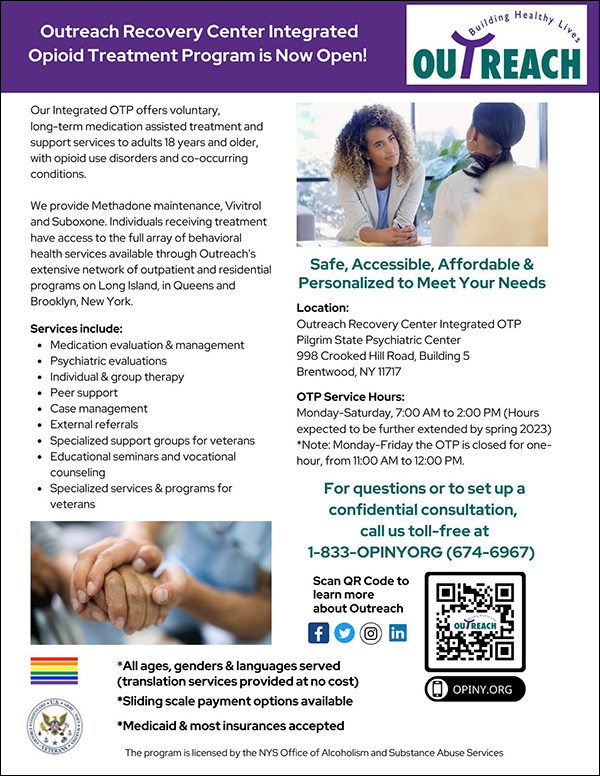There are now several identified strategies that can help address stigma toward populations with behavioral health challenges. Some involve providing public education. Some involve the addition of addiction and mental health‑related curricula to educational institutions and training programs for all service providers who frequently come in contact with these populations, such as in medicine, social services, criminal justice, etc. Another is to shine a light on people who are in recovery and, in doing so, expose the all‑too‑often hidden reality that people can stabilize, recover, and more‑successfully manage their life and that individuals with behavioral health disorders can be every bit as moral, productive, intelligent, talented and humanly complex as the next person. We can also create venues for advocating pro‑recovery messages, policies and programs as well as promote community spaces where recovery can flourish and serve as a beacon of hope to others.

Kevin Wadalavage, LMHC, CASAC 2, MAC
While these efforts might require initiative on the level of policy, resources, and coordination, others can be in our individual hands. One of these involves the skillful use of our language to reduce stigma. George Orwell wrote in Politics and the English Language, “But if thought corrupts language, language can also corrupt thought.” If we are trying to address how people think about those with behavioral health disorders, we need to cultivate an awareness and discipline around our choice of words. This is obviously not a new idea and the professional and general culture use of certain “acceptable words” can shift over time. We used to commonly refer to people with an Opioid Use Disorder as “junkies” and individuals with schizophrenia are less‑often called “schizophrenic” in order to avoid defining them solely by the symptoms of their disease just as we would unlikely call someone with arthritis an “arthritic.”
The use of “person-first” language sees the person before we see what condition they might have. While some are more obvious, such as referring to people with no further use of problematic drugs and/or negative toxicology results as “clean,” versus someone who tests positive as “dirty,” or having “failed” the test, other words, and phrases ‑ especially those pertaining to addictive disorders ‑ might be harder to translate into more neutral language.
To help with this, the National Institute on Drug Abuse (NIDA) released a set of guidelines on how to avoid stigmatizing language, entitled “Words Matter: Preferred Language for Talking About Addiction.” For instance, the guidelines state that saying someone “abuses” drugs open that person up to negative judgment and suggests “uses” instead, regardless of their legal standing or functionality consequences. Prescription drugs might be “misused” if they are consumed outside of how they were intended. Stating someone is on “Medication‑Assisted Treatment” is discouraged as the phrase implies that solely using a medication such as methadone or buprenorphine to address an Opioid Use Disorder is not a treatment on its own, just as antidepressants might be a stand‑alone therapy for some.
Changing our language use will be difficult in some cases. It might require retraining responses and word usage we have been using a long time as both participants in the general culture and in our professional roles. In addition, some of our patients will find it difficult to go along with these changes. People in some Twelve Step groups often refer to themselves as “alcoholic” or “addict” as an anchoring phrase to remind themselves of who they are or to be consistent with the language of their fellowship, even though the NIDA guidelines discourage this usage, instead preferring phrases such as “Person with a Substance (or Alcohol) Use Disorder.” Some people who identify as a proud and special part of a neurodiverse community might not see why we should not call someone “Autistic.” The harm reduction community has asked us to consider whether labeling someone who has failed at an attempt to change their behavior as having a “relapse,” which implies a discouraging failure as opposed to a learning opportunity which can be part of the journey towards recovery.
The invitation and challenge for us as individuals and/or organizational service providers will be to make thoughtful decisions around using language that can serve to reduce stigma while also continuing to be effective communicators as we conduct our day‑to‑day interactions and interventions. This can start by considering our own current language choices and which ones have the potential to contribute ‑ even subtly and without any antagonistic intention ‑ toward negative judgments, blame, inaccuracies, etc. which can feed into the very stigma which we and those we serve might encounter. This can be hard, as it will involve changing sometimes long‑held and calcified patterns of thought and communication. Some patients will laugh at my referring to them as a person in recovery from an alcohol use disorder instead of their own self‑reference as a “former drunk.” That’s okay. Just as a physician might refer to a patient’s self‑identified “stomachache” as gastritis, they can still work together towards the patient getting better regardless of whether that “teachable moment” around less-stigmatizing language becomes available.
Likewise, organizations are invited to consider a “language audit” and think about whether their promotional, patient, and professional messaging, forms, handouts, etc. can be considered to have potentially negative and damaging meanings. Sometimes even hearing staff using different word choices with the same meaning, such as one saying “he’s been clean for two weeks” versus another’s “he’s not been using for the past two weeks” can invite a discussion during a supervisory or staff meeting, as can just a general discussion on thoughts and feelings around use of non‑stigmatizing language, with examples.
In the spirit of “progress, not perfection,” even those who mindfully work towards changing their personal, professional and/or organizational language choices can expect such shifts to occur only over time, as this includes a deculturation process. Even some of our lead government agencies, such as NIDA, National Institute on Alcohol Abuse and Alcoholism (NIAAA), and Substance Abuse and Mental Health Services Administration (SAMHSA) continue to use the term “substance abuse” in their own titles even though that is considered a less‑than‑neutral term and does not follow the recommendation that the Office of National Drug Control Policy issued in 2017. There are efforts currently underway to change some of these names.
As with other language shifts that might be occurring in our culture, let us be gentle and understanding of ourselves and others while still actively working towards choosing those words which can advance compassion and proper care for those we serve.
References
Orwell, G. (2013). Politics and the English language. Penguin Classics.
“Words Matter: Preferred Language for Talking About Addiction” NIDA Addiction Science Series, June 23, 2021
Office of National Drug Control Policy, “Changing Federal Terminology Regarding Substance Use and Substance Use Disorders.” January 9, 2017. Available online at: https://obamawhitehouse.archives.gov/blog/2017/01/13/changing-language-addiction







